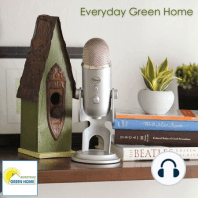35 min listen
The Truth About Green Product Labels
ratings:
Length:
35 minutes
Released:
Feb 9, 2022
Format:
Podcast episode
Description
What does it mean to buy green? There are no standard definitions for the words used to describe green products, so we sometimes tend to confuse products that sound green or claim to be green with those that truly are sustainable and environmentally friendly. Some companies intentionally use words like natural or eco-friendly as a marketing ploy to imply that their products are better for you and the environment than they may actually be. That is known as greenwashing. Unfortunately, many companies that greenwash their products spend a lot more time and money on marketing than on becoming more sustainable and ecologically friendly. I am Marla, the Green Home Coach. Today, I am pulling a podcast out of the archives in which Tony Pratte, my regular co-host, and I dive into the concept of greenwashing. In our conversation, we explain what you can do get above and beyond greenwashing, take action, and do better. We focus on green labels for the home and explain how they can work for you. Green labels for the home cover everything from energy efficiency to water efficiency to resource efficiency to toxin-free products and recycled materials. Stay tuned for more! Green Guides Greenwashing has been going on for a couple of decades now. Lately, people have been getting more concerned about it. Due to the current uncertainty surrounding the environmental and eco-friendly claims that companies have been making, the Federal Trade Commission has created green guides to help ensure that marketing claims regarding the environmental attributes of products are substantiated and truthful. Wise up to greenwashing We all need to wise up to greenwashing and realize that we vote with our dollars. Many of us base our purchasing decisions on the performance, sustainability, and culture of the companies we buy from. So we are usually willing to pay a moderate premium for products made by people and companies authentically committed to being better environmental and health stewards. Green labels A lot of research goes into figuring out if products are what they claim to be. Green labels prove that research has been done on products by a green label-certified independent third party. Green labels give us guidelines to ensure that the products we buy will protect us, our families, and our fellow human beings. If the third party did not exist, anyone would be able to do or say whatever they wanted about any product. Green labels give us the peace of mind that comes from knowing we are using something better. Greenwashing The term greenwashing got coined about ten years ago. It gets used when someone thinks or hopes, rather than knows, that a product is green. It is nothing more than marketing hype or the misdirection of consumers because, although something gets claimed to be good for the environment, in reality, that may or may not be so. The FCC and greenwashing The FCC (Federal Communications Commission) has put out rules about what you may say and claims you may make about a product. There is also a standard code of ethics for marketers, and the American Marketing Association has specific rules that forbid marketers from making any unsubstantiated claims. Using 'green' terms Many people- even those in the home-building industry, do not understand fully what green terms mean. Nor do they understand their value. And they often do not even know how to use the terms correctly. So they tend to throw them around loosely, without understanding the consequences or the ramifications that are sure to follow. For example, a home that has Energy Star-certified, energy-efficient windows cannot be described as an energy-efficient home simply because it has an energy-efficient feature in it. No real meaning Some terms have no real meaning to the FCC, like natural, which is often used to describe food and personal care products. Specific rules There are some specific rules for using the word 'organic' to describe products. The goal of green labels Green labe
Released:
Feb 9, 2022
Format:
Podcast episode
Titles in the series (100)
Eating for Health - Ours and the World with Hannah Levbarg: You can make a bigger difference than you think to the environment by making small changes to what’s on your plate. We’re talking about food today, and we have Hannah Levbarg joining us to talk about how to green your plate. Hannah will be... by Everyday Green Home
